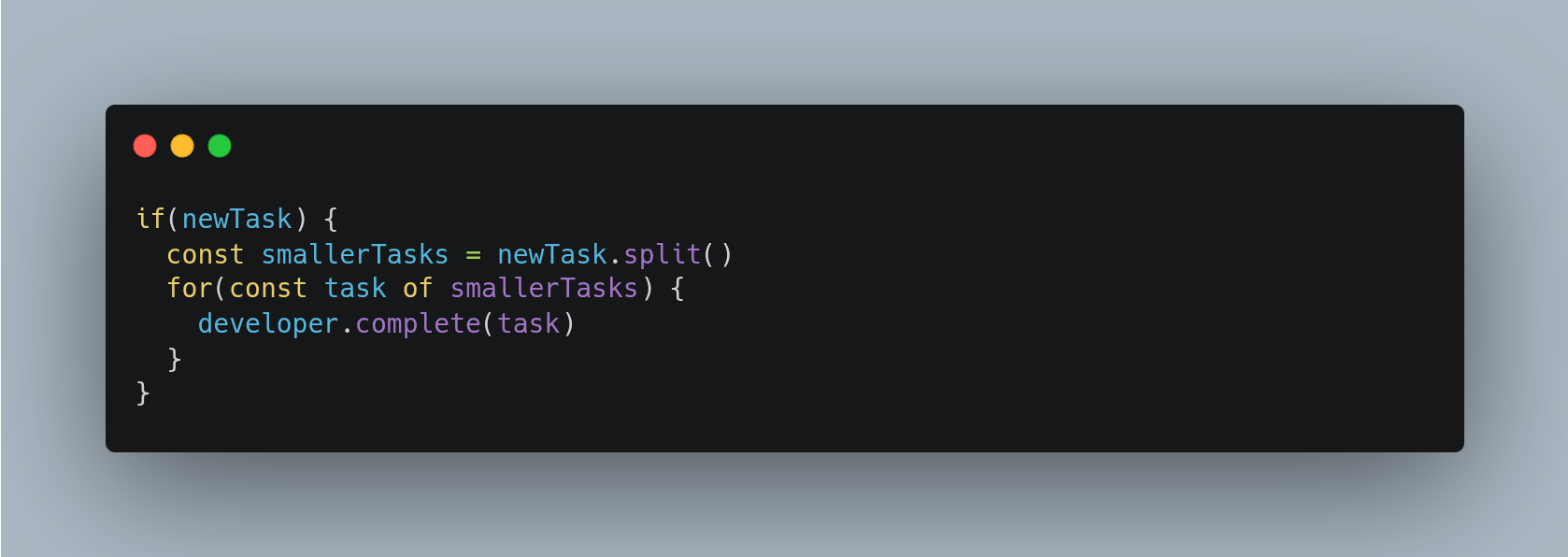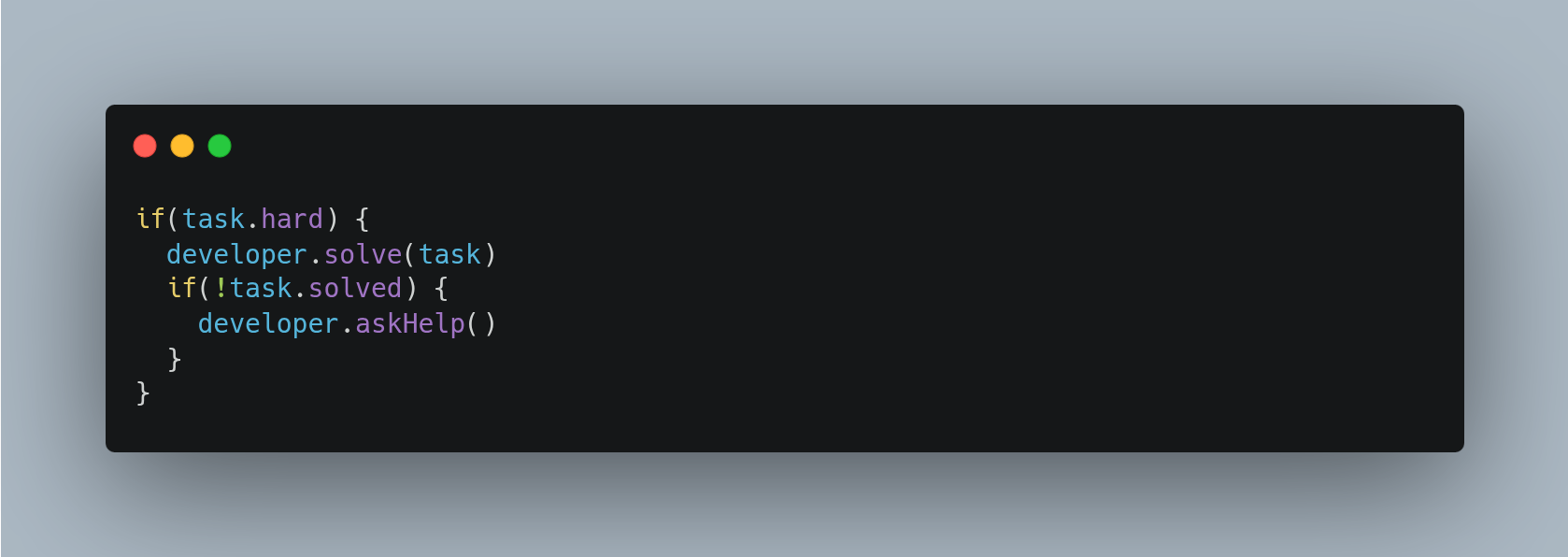6 Principles I Apply Every Day as a Software Developer
Table of Contents
Self-Efficacy

I believe self-efficacy is the most important soft skill in the work of a software developer.
Self-efficacy is the awareness that you can overcome any obstacle and complete a given goal — provided you have enough time and resources.
There will always be things we don’t know.
The difference lies in how we react to that lack of knowledge.
If we get discouraged because we don’t yet know how to tackle a problem, the process will become much harder.
If instead we face the problem without rushing to solve it and with the confidence that we will solve it, the goal immediately feels much more achievable!
Breaking the task into smaller parts helps a lot — the problem becomes more manageable, and solving smaller tasks helps morale by showing visible progress.
Keep Learning Always

I believe a good developer, when faced with a new problem:
- applies what they’ve already learned
- learns what they haven’t learned yet
- next time, they’ll start with a broader set of knowledge
This is how you grow and gain power — the power to solve problems in more ways.
It’s often said that the fewer words you know, the less you’re able to express yourself. This is also true in programming.
Different languages do the same things in different ways, offering alternative perspectives to solve the same problems. Learning more languages expands your mind.
My passion for programming comes from the fact that it allows me to build anything.
Learning new concepts is deeply satisfying because it allows me to create more diverse projects and broaden my horizons!
Learn What Scares You

Another important piece of advice: experiment with everything — especially with what feels hard and scares you because of it.
Difficult things often scare us because, deep down, we know that beyond being difficult, they’re also things we should probably learn.
It’s more comfortable not to — it costs less energy.
Try everything you come across: that new IDE, that new framework, that operating system!
Once you’ve experimented, you’ll be able to form your own opinion and understand whether and how it fits into your workflow:
- If you like it, why do you like it?
- If you don’t, why not?
Another reason to learn what scares you: it scares most other people too. But most people stop at fear.
Pushing one step further can put you ahead of the crowd — and that might be exactly what helps you stand out.
Face what scares you. That’s how you stand out.
Maintain a Positive Mindset

Having a positive mindset at all costs is a strategic choice.
If you start thinking negatively every time things don’t go as expected, you’ll make the whole process ten times harder, more stressful, and more negative.
A negative mindset blows every task out of proportion — even the small and simple ones become huge and difficult.
Self-efficacy helps here too:
if you know that you can overcome any obstacle, no matter how big, with enough time and resources,
then any task becomes less intimidating — smaller, simpler.
There’s not always a rush to complete a task. Take your time. Breathe.
Don’t let anxiety or negativity take over — they’re poor advisors when it comes to solving problems.
Don’t Be Afraid to Ask for Help

This is a very important one.
We often think others expect us to be perfect — to understand everything at once, to know how to do anything. But that’s not true.
Ask questions if something isn’t clear — whatever it is — and don’t be afraid of sounding dumb.
Ask for help, but only after you’ve truly tried to solve the problem using all the tools you have: Google, AI, your own reasoning.
Asking for help or clarification doesn’t make you a worse developer — it actually shows professionalism.
If you pretend you understood something when you didn’t, it costs the company time and money — when it could be solved in 5 minutes of explanation.
Be Proactive

It sounds like a cliché, I know — everyone says to be proactive — but that’s because it works.
It works for the same reason learning what scares you works:
there are far more reactive people than proactive ones.
It’s normal to be reactive: it takes less energy and feels safer.
But those who choose to be proactive often get to where they want much faster.
Think of opportunities as a river that begins at the top of a mountain.
That river turns into a waterfall that ends in a heated lake — cozy, full of comfort.
Would you rather stay in the warm lake and wait for whatever comes your way,
or leave your comfort zone, face the effort of climbing the mountain, and catch the opportunities before they flow down to everyone else?
The answer would be obvious if opportunities were so abundant they just poured down freely — but that’s not reality.
It’s human to choose comfort. The heated lake is relaxing.
And yes, sometimes opportunities arrive.
But those who climb toward the source, those who make the effort, often find better opportunities.
You don’t need to climb the mountain every single day.
Rest is also productive.
But knowing you can climb — and doing it regularly — makes all the difference.
And when I talk about opportunities, I don’t just mean “getting a new job.”
I also mean speaking up at work, suggesting an improvement, improving a workflow, fixing a vulnerability.
You have nothing to lose and everything to gain.
It shows you’re professional, genuinely interested in what you’re doing — and if your idea is taken seriously, both you and the project win.
When you speak up about how something could be improved or done differently, there are two possible outcomes:
-
Maybe there’s a good reason things are the way they are: in that case, your alternative won’t be adopted — but you’ll have learned something valuable you wouldn’t have otherwise.
-
Maybe there’s no real reason — or your solution is more modern and optimized, and simply didn’t exist when that piece of code was written: in that case, your idea might be better and worth discussing.
In both cases, you come out stronger. You show yourself to be engaged and professional.
Worst-case scenario? You learn something.
Win–win.
Which one of these principles do you already apply every day? Which one made you think?
Feel free to reach out — sharing ideas is already a step toward growth.